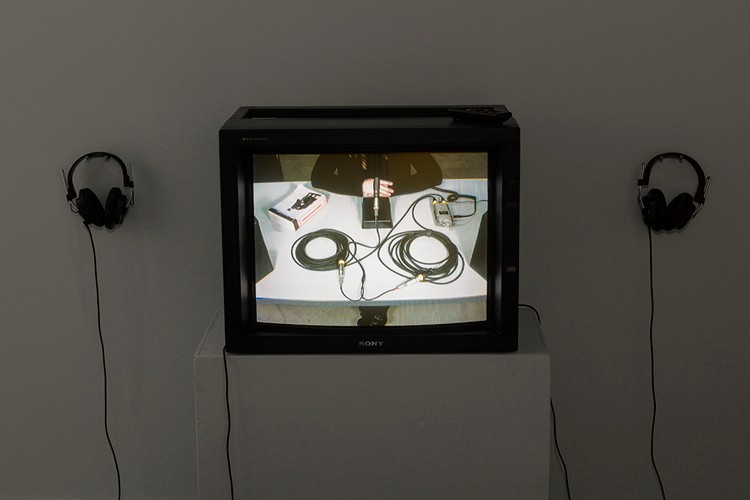COMBINE 2012: Annual Undergraduate Student Exhibition
Author: Pascal Robitaille
Artist: Kandis Friesen
 Kandis Friesen, Etj Kjenn Nijch Plaut'dietsch, 2011-2012, installation, looped video (video 25' audio 5' 45''), sound, inkjet with pigmented ink on archival photographic cotton rag (121.92 x 91.44 cm). Photo: Guy L'Heureux
Kandis Friesen, Etj Kjenn Nijch Plaut'dietsch, 2011-2012, installation, looped video (video 25' audio 5' 45''), sound, inkjet with pigmented ink on archival photographic cotton rag (121.92 x 91.44 cm). Photo: Guy L'Heureux
About the artist
The work entitled Etj Kjenn Nijch Plaut’dietsch1 by Kandis Friesen is a visual and sound installation inspired by the work of Herman Rempel, author of the first dictionary of Mennonite Low German, a dialect spoken by more than three hundred thousand Mennonites. Two large photographic prints of scanned pages from the dictionary hang on the wall. A silent video projected on a screen shows the feet and hands of the artist who is seated at a table in front of a device that plays back audio recordings into two pairs of headphones available to the public. The audio recordings document a series of performances similar to the one shown in the video, in which Friesen repeats each of the words one by one as she hears them in the audio version of Rempel's dictionary, which is read by the author himself.
Lasting over thirty minutes, these performances push the artist to the limits of her ability to pronounce and repeat the hundreds of words, the majority of which she is hearing for the first time. On a few occasions, her voice becomes hoarse, her concentration wanes and, struggling to follow the pace of Rempel’s reading, she falls into a variety of phonetic problems. This type of self-challenge is reminiscent of certain works of Marina Abramović, such as Freeing the Memory (1976). In that performance, which is executed in front of a video camera, Abramović names every word that comes to mind, stopping only after a really long period of time, when she is too worn out to pronounce any more of them.
However, while Abramović basically explores physical and mental exhaustion as an esthetic process, Friesen tries to appropriate her cultural background through the vernacular. As a second generation Canadian Mennonite, she grew up learning English and German. Among friends and family, Mennonite Low German was the language of casual conversation, stories and humour. By learning the dialect, the artist reconnects with a large part of the knowledge and traditions of her ancestors. Preserving this heritage through the language is even more meaningful to Friesen since Mennonites have a long history of migration and feel that their culture and identity is not rooted in the concept of geographical boundaries, but rather in the concept of language as the conduit of all traditions. This is reflected in the Mennonite Low German saying: "The only homeland for a Mennonite is our mother tongue."2
Biographies
Pascal Robitaille
Pascal Robitaille is currently completing his Bachelor of Fine Arts with a major in art history at Concordia University. His research interests include the representation of the male body, punk culture and performative practices.
Kandis Friesen
Born and raised in the prairies, Kandis Friesen is an artist and cultural worker based in Montreal, Quebec. Working with interdisciplinary means, her practice looks at contexts of labour, language and articulation, sites of national and cultural identity, and the role of document and archive in constructions of collective memory. Labour intensive and process-based, her work often functions as reconfigured visual and aural texts, modular and overlapping constructions that act critically in the interest of memorial, recovery, and restoration. Friesen has exhibited locally and internationally at various festivals and galleries, including La Centrale, SKOL, and articule in Montreal, Festival Miden (Greece), THEOFFCENTER (San Francisco), WNDX (Winnipeg), Centre for Art Tapes (Halifax), and OK.QUOI?! (Sackville), and recently won the 2012 Images Festival's Steam Whistle Homebrew Award for the collaborative video Tape #158: Document 2B, produced with Toronto-based artist Nahed Mansour. Friesen received her BFA in Intermedia/Cyberarts from Concordia University in 2012.

